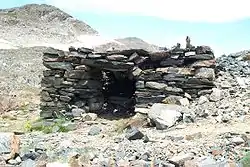Great Sierra Mine Historic Site
The Great Sierra Mine Historic Site preserves the site of the largest mining operation in what would become Yosemite National Park. The mine was located on Tioga Hill on the crest and eastern slope of the Sierra Nevada, one of several claims intended to work the Sheepherder silver lode. The Sheepherder lode was discovered in 1860, and rediscovered by shepherd Thomas Brusky, Jr., who staked a number of claims in the area. In 1881 all of the claims were bought out by the Great Sierra Consolidated Silver Mining Company and established the company town of Dana. Due to the 11,000 foot altitude the town was soon relocated to the bottom of the hill at Bennettville.
Great Sierra Mine Historic Site | |
 | |
  | |
| Nearest city | Lee Vining, California |
|---|---|
| Coordinates | 37°55′39″N 119°16′5″W |
| Built | 1881 |
| Architect | Great Sierra Consolidated Silver |
| NRHP reference No. | 78000382 |
| Added to NRHP | May 24, 1978[1] |
After an adit was driven 1784 feet into the side of the hill at an expenditure of $300,000, operations were closed down in 1884. They resumed with modern equipment in 1933, but did not find the Sheepherder Lode, and operations ceased for good.
Today, five stone cabins, a powder house and a blacksmith shop remain. The shafts have collapsed or have been filled in.[2]
References
- "National Register Information System". National Register of Historic Places. National Park Service. April 15, 2008.
- "Great Sierra Mine Structure No. 1". List of Classified Structures. National Park Service. December 9, 2008. Archived from the original on May 21, 2011. Retrieved December 10, 2008.
